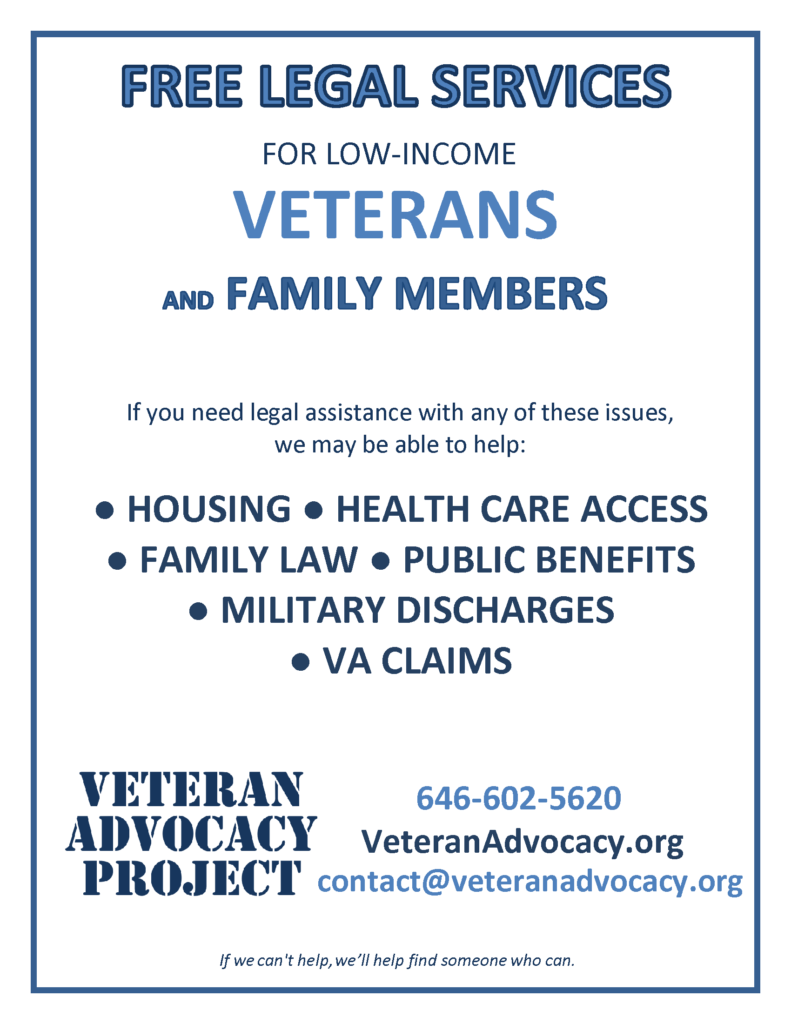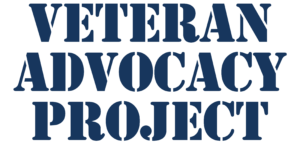
From community health centers to veteran treatment courts, from local jails to housing court, we meet veterans where they are. While our attorneys tackle the legal challenges, our advocates ensure that our clients are connected to appropriate social services. With a dedicated team, the project empowers veterans and their families to achieve the stability needed to regain their health and rebuild their lives.
VAP has three program areas:
- Our civil practice ensures housing and income stability through homelessness prevention with social services agencies and medical-legal partnerships with Vet Centers and community health clinics.
- VAP’s VA practice focuses on Character of Discharge determinations, disability claims related to mental health, disputing over-payments, and setting up apportionment.
- Our Department of Defense practice fights for veterans with unjust less-than-honorable discharges by representing them before the Review Boards in applications for upgrades and corrections.
The common thread throughout our advocacy is that we fight for individuals who are living with mental health challenges. Our services provide access to health care and benefits, prevent incarceration and recidivism, keep veterans and their families in their homes, and empower veterans by removing barriers to success.
OUR INITIATIVES:
Along with our regular services working on eviction prevention, benefits hearings, VA claims, and access to health care, VAP has launched a few special initiatives to meet the needs we see from our clients.
- Discharge Upgrade Clinic (“DUC”)
- Justice-Involved Veterans Services
- Medical Legal Partnerships: Vet Centers and Community Healthcare Network
- Supportive Services for Veterans Families (SSVF) Homelessness Prevention
Discharge Upgrade Clinic (“DUC”)
We are one of the few legal services organizations with a practice dedicated to military discharge upgrades. Members of the military leave service with one of six discharge statuses that will determine their access to VA health care and disability benefits. Post-traumatic stress and traumatic brain injury wreak havoc on our servicemembers and the resulting behavioral health problems can easily lead to less-than-honorable discharges that deny access to the VA. In other words, veterans need treatment for the condition that got them cut off from treatment.
There are hundreds of thousands of veterans with less-than-honorable discharges and for many of them benefits and health care from the VA are a long-shot. The suicide rate for a veteran with an misconduct discharge is nearly three times that of their fellow veterans. A bad discharge is also a serious barrier to employment, because few veterans will get a chance to explain their status — to explain that being late a few times, or unauthorized absences to get away from an attacker, or smoking marijuana to self-medicate their overwhelming anxiety was the reason for their “Other Than Honorable” status. Cut off from the benefits they earned, and often alienated from their communities, individuals with “bad paper” are appearing in emergency rooms and criminal courts at higher rates than other vets around the country.
A recent government study showed that from 2011 to 2015, of the servicemembers who were discharged for misconduct, 62 percent had already been diagnosed with post-traumatic stress disorder or a similar condition related to misconduct. It is clear we are punishing mental illness and injury.
During the first decade of the Global War on Terror, over 30,000 veterans with Post Traumatic Stress were “diagnosed” with Personality Disorder and discharged with that stigmatizing narrative on their discharge papers. Instead of properly diagnosing their mental health conditions, these veterans were labeled and kicked out with no access to care or benefits.
Over 100,000 LGB servicemembers were discharged for their sexual orientation because it was illegal to be gay in the military. The “Don’t Ask, Don’t Tell” (DADT) policy implemented in the 1990s offered little protection. The section of the Uniform Code of Military Justice that kept thousands of servicemembers from serving openly, often living in fear of being discovered, was not repealed until 2011. The veterans who were discharged under DADT can correct the record with an application to a DOD Review or Correction Board. (Sadly, legislation making an upgrade automatic for these individuals has languished in Congress for years.) Yet, there are other LGB servicemembers who were discharged under a pretext of misconduct when discrimination was the real reason; they need expert advocacy to uncover the truth and correct their discharges.
The Veteran Advocacy Project believes we owe it to all of these servicemembers to fight for their access to care. We are training pro bono attorneys around the country to represent veterans before the Department of Defense Review Boards.
Our partners include: New York County Lawyers’ Association, Orrick Herrington & Sutcliffe LLC, Patterson Belknap Webb & Tyler LLP, Duane Morris LLP, Deutsche Bank, Societe Generale, Debevoise & Plimpton LLP, and others.
For more information about our Discharge Upgrade Clinic, please email [email protected].
If you are seeking assistance with a discharge upgrade, please call 646-602-5620 or check out our CONTACT page.
Justice-Involved Veterans Services
By bridging the divide between criminal and civil legal services, and providing services within the field of veterans law, the Veteran Advocacy Project reduces justice-involved veterans’ collateral consequences, assists the families that are affected by incarceration of a loved one, removes barriers to veterans benefits and programs, and educates stakeholders in the criminal justice system on veteran-specific resources that offer culturally competent trauma care, housing assistance, and primary and behavioral health care.
Through education, outreach, and advocacy, VAP improves outcomes for veterans and their families interacting with the criminal justice system in any capacity. In collaboration with the VA VJO team in New York, VAP conducts intake at Rikers to ensure that veterans and their families can keep VA benefits while a veteran is incarcerated or that veterans can get started on discharge upgrade applications to remove barriers to employment and gain access to the benefits they earned.
Medical Legal Partnerships
VAP is partnered with the VA, providing legal assistance onsite at Vet Centers in New York. These centers serve combat veterans and their families, providing counseling and transition assistance.
For those veterans who cannot access the VA, we launched a partnership with Community Healthcare Network, a system of federally qualified health centers across New York City. Too many veterans forgo physical and mental care because they are struggling against complex benefits systems or fighting to maintain income and housing. Our attorneys work on those issues and on VA character of discharge (COD) and DOD discharge upgrade applications so that these veterans can access the vast federal benefits they earned through service. We also assist veterans and their families with eviction prevention and access to income while they await federal adjudication of their cases.
When doctors, nurses, social workers, and lawyers team up to address social determinants of health, we improve health outcomes and ensure that clients achieve the long-term stability needed to thrive.
Supportive Services for Veterans Families (SSVF)
VAP provides legal services to the veterans of two SSVF grantees in New York: Jericho Project and Services for the UnderServed (S:US). Their programs work with unhoused veterans in New York; VAP is onsite once a week meeting with veterans and caseworkers, removing barriers to income and ensuring housing stability. While VAP provides advice and representation in numerous areas of law, with a focus on eviction prevention, Jericho and S:US are important partners in our holistic approach to serving veterans.
